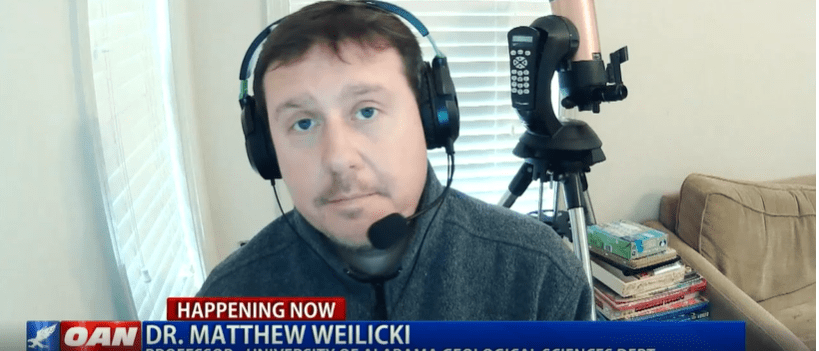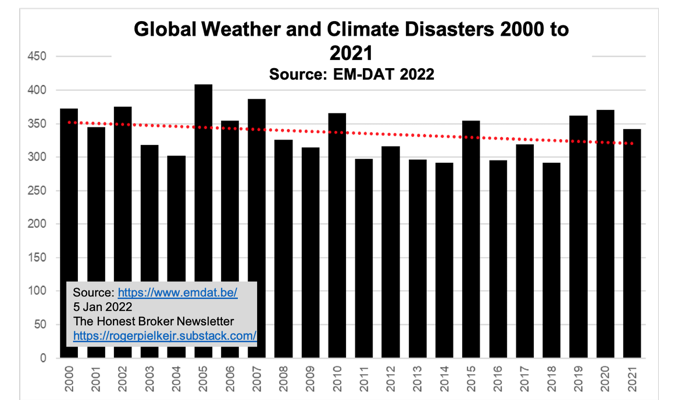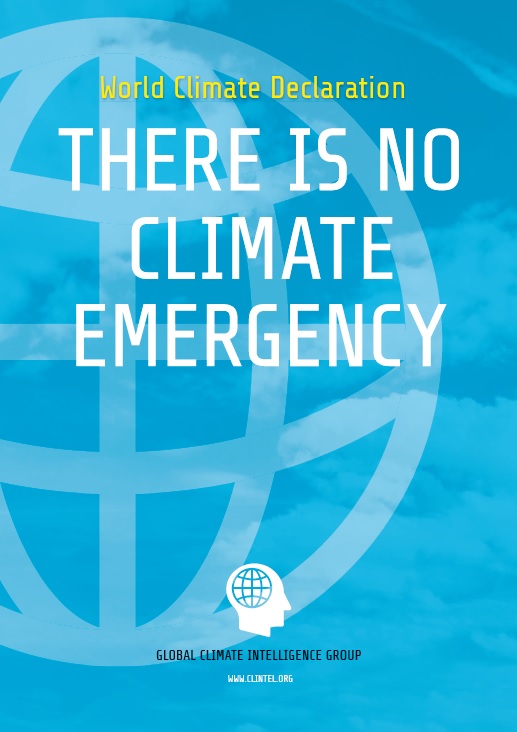
Dr. Weilicki Interview is Climate Experts Sign “World Climate Declaration” Saying There’s No Climate Emergency
Recently OAN’s Stella Escobedo interviewed Dr. Matthew Weilicki concerning his joining the declaration against any climate “emergency.” The video can be accessed by clicking on the red link above. Below I provide a transcript with my bolds along with some exhibits. SE refers to Stella Escobedo and MW to Matthew Weilicki
SE: Well, you have probably heard that climate change is an existential threat and we need to do something about it right away. The World Economic Forum was just held in Davos, Switzerland, with discussions of the climate crisis front and center. Biden has persuade Democrats in Congress to provide hundreds of billions of dollars to fight climate change.
But there are hundreds of scientists around the world who say there is no climate emergency. In fact, they have signed the World Climate Declaration. And one of the biggest things they say is climate science should be less political. And I’d like to welcome to the show Dr. Matthew Weilicki. He’s currently a professor in the Department of Geological Sciences at the University of Alabama. Dr. Weilicki., thank you so much for joining us.
MW: Thank you. Thank you for having me.
SE: Of course..So before we get started, Dr. Weilicki, I want you to tell our viewers a little bit about your educational background and why you’re educated enough to to have this conversation and to talk about this topic.
MW: Yes, absolutely. So my original bachelor’s degree is actually biochemistry and cellular biology. I worked in four novel vaccine companies for them through my original degree, and I went on to kind of shift gears and I went and got a Ph.D. in geochemistry from UCLA. And because I don’t really work in climate science per se, and I also don’t work in oil and gas exploration, I am an Earth scientist that uses a lot of the same tools that both of these types of fields will use. But I felt that I could take an objective look in and offer my expert opinion without really having any kind of, you know, any sort of motivation on either side. And I thought that would allow me to take an objective view. But the background that I have is very similar to the way that we try to identify what the climate looked like in the past, which is mainly through geochemistry.
SE: So, Dr. Weilicki, you are one of more than a thousand scientists who have signed this petition that says there is no climate emergency. Explain why you say that.
MW: I think if we take an objective look at the data, it’s very difficult to see any metric that would allow us to explain the state of the climate as in an emergency or in a crisis, as you commonly hear. If we look at, for example, human lives lost from natural disasters, I ask my students this all the time and they are convinced that there has been significantly more lives being lost in natural disasters today than over the last hundred years. Let’s say that number has decreased by something like 97%.

Source: Bjorn Lomborg
And so it’s clear. And the graphic you’re showing now, another question that I ask is how often are how many natural disasters are occurring? And so these students are usually freshmen and sophomores and things like that. And I ask them these questions about about the state of the climate. And I’m noticing that they have the exact wrong view of what’s happening. They’re convinced that more people are dying, more disasters are happening. And if you look at the empirical evidence, the data just doesn’t support that claim. And I think that the mental health effects are really damaging to these young people.

Source: Roger Pielke, Jr.
SE: Well, any time we do have massive flooding, heat waves or wildfires, as you just mentioned, we’re constantly being told it is climate change. Even the World Meteorological Organization has legitimized it. What are your thoughts on that?
MW: This is really part of the problem. This is this is why I blame these organizations. I don’t blame these young people for for believing this. I think if I was in my twenties, I would probably believe that the world is in catastrophe mode. But, you know, these these constant catastrophizing of weather events, weather is not climate. And to to harp and to take advantage of every extreme event to try to push your narrative is so disingenuous.
And these are smart people. They know that weather is not climate. Climate is very different. We’re talking about long term trends and variability in weather patterns and to try to catastrophize a single flood or a single hurricane and make the claim that if we didn’t burn fossil fuels or if we lowered atmospheric greenhouse gas emissions, somehow the flood wouldn’t have occurred or the hurricane wouldn’t have occurred. That is absurd. We know in the geologic record that these events happen. Sometimes they happen worse more than other times. But these happen. This is not has nothing to do with the amount of atmospheric greenhouse gas in the atmosphere. This is a much larger issue.
And to suggest that we wouldn’t have extreme weather if we could just change
one trace gas in the atmosphere is absolutely not scientific.
SE: Well, you have so many smart people like yourself who are speaking up saying there is no climate emergency. And yet do you feel like people like yourself are getting any real attention? In fact, many scientists get defunded for speaking out, get called climate deniers. How do you respond to that?
MW: Yes, absolutely. I think that’s such a it’s such a derogatory term. It’s. Clearly trying to link people that are skeptical about climate and making questions about science with Holocaust deniers. I was born in Poland, just a few hours from the gates of Auschwitz. I lost many family members in the Holocaust. To try to link me because I have questions about science to denying the Holocaust is absolutely disingenuous. It’s an ad hominem attack because people realize that the empirical evidence doesn’t support what they’re saying and how catastrophize they’re trying to make the climate and such. They don’t want to discuss the actual data, so they’d rather label you a name and try to deplatform you or defund you. And, you know, I find it to be a very disingenuous way of having a scientific discussion.
SE: You know, just a few days ago, you announced you’re leaving the university and a post on Twitter. I saw you say some of it is personal family related. But you also mentioned it’s no longer a place that embraces freedom of exchanging ideas. Can you elaborate?
MW: Yes. My life dream was to be a professor. My father was a professor ever since I was about 12 years old. And we made a pretty big sacrifice by moving from all of our families in California. We moved to Alabama because I really wanted to pursue this career, and I really started to realize pretty quickly that it wasn’t the way that my father remembered it. And when we would have discussions and this rise of illiberalism, that’s what I like to call it, this idea, these ideological ideas, the fact that there are certain things that are undiscussed that you can’t discuss.
What I was talking about was DEI, diversity, equity and inclusion.
And even having a discussion about this is very similar to climate.
If you just want to look and investigate whether something that’s probably has good intentions like inclusivity. I understand it’s a noble cause, but if we don’t look at the outcomes, it’s very difficult to figure out whether this is having the intent that we want. And I started to realize that just speaking out about some of these things was really enough to get you labeled, you know, a certain degree bigotry term, whichever one it is, a denier or sometimes even a racist, because you’re having questions about the outcomes of some of these diversity equity inclusion policies.
And it was clear to me once I made my my Twitter thread, I was attacked by faculty members from all over the place, even UA, calling me a racist. They tried to link me to some anti-Semitic writings that happened on the sidewalk somewhere on campus. It just made it prove to me very clearly that if you have genuine questions and you see negative impacts on students, even bringing that up is, is is, you know, paradigm to being a heretic and you get ostracized and people call you out. And so that’s definitely one of the reasons that made it easier for me to start walking away from from this profession.
SE: Well, you’re not alone. And it’s unfortunate that this is happening. It’s happening in your industry. It’s happening to parents who are speaking out, you know, for their children in schools. So it’s unfortunate. But I do hope that this doesn’t push smart people like you completely out of science. Dr. Weiliki, thank you so much for being here.
Dr. Matthew M. Weilicki Homepage
Footnote:

Background

Click to access WCD-version-100122.pdf

Reblogged this on Climate Collections.
LikeLike
“why you’re educated enough to to have this conversation and to talk about this topic” no one should have to explain this. Science is about the what, not the who.
LikeLike
True, Bruce, her wording was poor. Better would have been, “Tell us about your interest and involvement in this topic.”, rather than an appeal to authority.
LikeLike